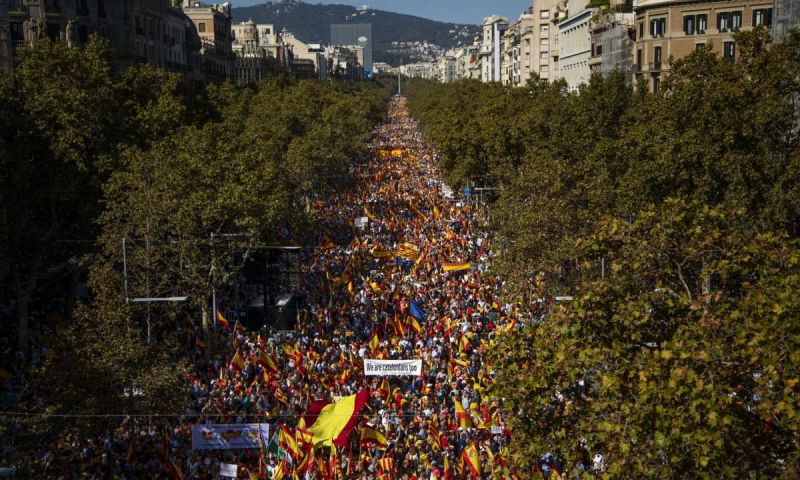
Europe, above all, is about freedom, peace and progress. We must move forward with these values and make it the leading model of integration and social justice, one that protects its citizens. The Europe that we aspire to, the Europe that we need, the Europe we are building is based on democratic stability within our states and cannot accept the unilateral breach of its integrity. The Europe we admire has been built on the principle of overlapping identities and equality for all citizens, and on the rejection of nationalist ideologies and extremism.
For this reason, the challenge of separatism in Catalonia, devised against and outside Spain’s constitutional framework – and silencing the majority of Catalans who are against independence – is a challenge for Europe and Europeans. Preserving these values in Catalonia today means protecting the open and democratic Europe for which we stand.
In 1978, Spain adopted a fully democratic constitution, thus escaping the long and dark shadow of dictatorship. That historic document was endorsed by almost 88% of voters in a referendum. In Catalonia, support and turnout were even higher: 90.5% of Catalans backed the new constitution. Today, the Democracy Index, published by the Economist, rates Spain as one of the world’s 20 full democracies.
Contemporary Spain is Europe’s second most decentralised country, and Catalonia enjoys some of the highest levels of regional self-governance on the continent, with wide-ranging devolved powers over crucial sectors such as media and public communication, health, education and prisons.
Today, however, Catalonia is associated with a profound crisis, caused by the unilateral breach of Spain’s constitutional order brought about by the region’s separatist leaders in the autumn of 2017. Catalonia’s leaders reneged on all the resolutions set out by the constitutional court, passed unconstitutional “disconnection” laws from the Spanish state, held an illegal referendum and declared a purported Catalan republic.
No state would ever allow the unilateral secession of a territory that forms part of its constitutional order. And no democrat should support the path taken by the separatist leaders, who won less than 48% of the votes cast in regional elections.
My government has promoted the expansion of rights and liberties and would never agree to even the smallest restriction of freedom of expression. The president of the Generalitat de Catalunya (Catalonia’s regional government), Quim Torra, is a radical separatist, but he is not prevented from expressing his views freely, despite the pain and damage they cause to peaceful coexistence in Catalonia. In Spain, everyone may express their opinions as they wish, provided that they do not promote and encourage criminal acts.
The supreme court recently ruled against nine separatist leaders charged for the illegal acts they carried out in the autumn of 2017. The court acted with the greatest transparency: the entire proceedings were televised live.
I fully respect those Catalan citizens who have peacefully exercised fundamental rights to protest and to strike against the ruling. But the organised and intentional acts of violence that have occurred across Catalonia in recent weeks are something else altogether and in no way represent the region’s tolerance and welcoming spirit.
The illegal effort to bring about Catalonia’s independence has followed a roadmap that is all too familiar in today’s Europe. It has used a web of lies, spun by fake news and viral messaging, to divide societies by exploiting the rhetoric of reaction to encourage polarisation and confrontation.
Recently, the president of the main pro-separatist association, Elisenda Paluzie, stated that images of violent clashes between protesters and police officers had “positive and negative effects” as they “lent visibility to the conflict” and “keep us in the international press”. But if we have learned anything from Europe’s painful and bloody history, it is that no political ambition can ever justify resorting to violence, much less the normalisation of violence as a political tool.
My government has responded with speed and proportion to restore peace and stability to Catalonia’s citizens, a majority of whom reject the current unstable impasse.
I call on the president of the Generalitat to condemn the violence fully and clearly, and to act as president of all Catalans, not only those who share his political beliefs.
I will not allow another extreme nationalist outbreak to undermine the success of Spanish democracy. In the discussion about the future of Catalonia, only the healing and coexistence of the Catalan people and society, not independence, is on the agenda. This is our main challenge: to ensure that all understand and accept that a unilateral path toward independence constitutes a direct affront to fundamental democratic principles.
At this moment, restraint and moderation are imperative. We will act with all the firmness needed to defend peaceful coexistence, all the while recognising that we have an opportunity to start a new chapter.
I know that there are open wounds, pain and frustration. But, despite this, there is an opportunity for dialogue and hope, recognising what we have achieved together and thinking about what we can do, together. I will never turn away from dialogue, but for this to happen the separatist leaders must abide by the constitution and respect the rule of law.
My government has positioned Spain at the forefront of the project of European integration and the fight against our greatest global challenges. These objectives transcend a nationalist vision, and we need Catalonia and Catalan society to help achieve them.
Pedro Sánchez is prime minister of Spain. This article was originally published by Project Syndicate
